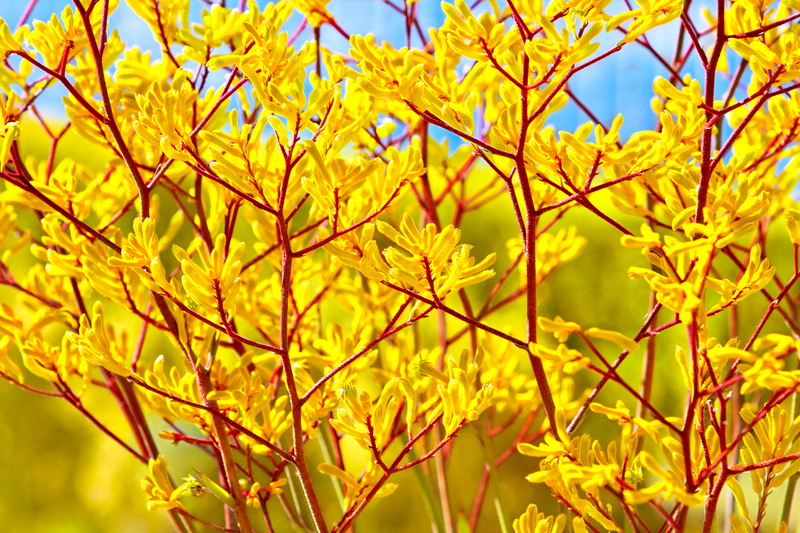Eco-Friendly Soil Enrichment through Waste Reuse
Posted on 14/08/2025
Eco-Friendly Soil Enrichment through Waste Reuse: Sustainable Solutions for Healthy Soil
Eco-friendly soil enrichment through waste reuse is a crucial component in modern sustainable agriculture and land management. As society grapples with environmental challenges such as landfill overflow, declining soil fertility, and climate change, it becomes increasingly important to seek solutions that address multiple issues. Repurposing organic and certain inorganic wastes for soil enhancement not only diverts materials from landfills but also improves soil structure, nutrient content, and overall ecosystem health.

Understanding Eco-Friendly Soil Enrichment
Soil enrichment is the process of enhancing the fertility and structure of soil by adding materials that improve its physical and chemical properties. Traditional methods often rely on synthetic fertilizers, which can harm the environment through runoff and chemical buildup. In contrast, eco-friendly soil enhancement emphasizes the use of natural or sustainable materials to boost soil health with minimal ecological impact.
Benefits of Eco-Friendly Soil Practices
- Reduces landfill waste - Diverts organic and some appropriate inorganic materials from landfills.
- Improves soil structure and fertility - Adds organic matter and nutrients essential for plant growth.
- Supports biodiversity - Encourages beneficial microbial and insect communities.
- Mitigates climate change - Enhances carbon sequestration capacities of soils.
- Conserves resources - Reduces the need for non-renewable chemical fertilizers.
Types of Waste for Soil Enrichment
Various waste materials, when processed appropriately, can be transformed into valuable soil amendments. Let's explore the most common types:
1. Compost from Organic Waste
Composting is the decomposition of organic matter--such as fruit and vegetable scraps, coffee grounds, eggshells, grass clippings, and leaves--to produce humus-rich material. Compost is a powerhouse of nutrients and beneficial microbes, making it one of the best natural soil enrichers.
- How it enriches soil: Improves soil structure, increases water retention, nourishes beneficial organisms, and supplies slow-release nutrients.
- Eco-friendly impact: Reduces methane emissions from landfill and recycles essential nutrients back into the ecosystem.
2. Biochar from Agricultural Residues
Biochar is a form of charcoal produced by pyrolyzing biomass (such as crop residues, wood chips, or manure) under low-oxygen conditions. When added to soil, biochar can:
- Enhance soil aeration and water holding capacity
- Increase cation-exchange capacity, helping soils retain nutrients
- Sequester carbon for hundreds of years, reducing atmospheric CO?
- Stimulate beneficial microbial activity
3. Vermicompost from Food and Paper Waste
Vermicomposting harnesses the power of earthworms to convert food scraps and shredded paper waste into a nutrient-dense, soil-like substance known as worm castings. This process:
- Accelerates decomposition of organic waste
- Produces castings rich in plant-available nutrients
- Boosts microbial biodiversity in soil
4. Mulches from Yard and Landscaping Waste
Shredded branches, grass clippings, and leaves can be repurposed as organic mulch to cover soil surfaces. Mulching helps:
- Retain soil moisture and suppress weeds
- Regulate soil temperature for root health
- Add organic matter as the mulch decomposes
5. Industrial Byproducts (with Caution)
Certain processed industrial wastes--such as spent mushroom substrate or brewer's grains--can provide beneficial nutrients to soils when applied responsibly. Always ensure waste is free from harmful contaminants and heavy metals before use.
The Process: Turning Waste into Soil Gold
Eco-friendly soil enrichment through waste reuse involves a few key steps to transform waste into a safe and rich soil amendment:
Step 1: Collection & Segregation
- Separate organic waste from plastics, metals, and hazardous materials.
- Encourage community or household-level sorting for cleaner feedstock.
Step 2: Controlled Decomposition
- Initiate composting, vermicomposting, or biochar production to break down or transform waste material.
- Monitor temperature, moisture, and aeration to optimize microbial activity and ensure pathogen destruction.
Step 3: Curing and Maturation
- Aged compost/biochar allows for stabilization and mellowing of the end-product.
- Helps avoid phytotoxicity or nutrient imbalances in the soil.
Step 4: Application to Soil
- Incorporate at recommended rates based on soil tests and crop requirements.
- Apply as mulch, soil amendment, or top dressing as needed.
The Science: How Repurposed Waste Enriches Soil
Soil is much more than dirt--it's a dynamic environment teeming with life. Waste-derived amendments help by:
- Replenishing organic matter, a critical component for healthy soils
- Boosting nutrient cycling and availability (notably nitrogen, phosphorus, potassium, and micronutrients)
- Increasing soil porosity and root penetration
- Fueling the plant-soil food web by fostering beneficial microbes, fungi, and invertebrates
- Enhancing soil carbon sequestration, improving structure and combatting climate change
Environmental, Economic, and Social Advantages
Adopting eco-friendly soil improvement through waste reuse brings multifaceted benefits across different segments of society:
For Farmers and Home Gardeners
- Reduces input costs by replacing or supplementing expensive synthetic fertilizers
- Improves crop yields and quality sustainably
- Enhances soil resilience to drought and disease
For Communities and Municipalities
- Lowers waste management costs by diverting organic fractions
- Decreases landfill use and greenhouse gas emissions
- Fosters green jobs in waste collection, composting, and soil management
For the Planet
- Reduces fossil fuel dependence (from synthetic fertilizer production)
- Protects water resources by reducing runoff and pollution
- Preserves biodiversity both above and below ground
Challenges and Considerations in Waste Reuse for Soil Enrichment
While the benefits of eco-friendly soil enrichment through the reuse of waste are clear, a few challenges must be addressed to maximize its potential:
- Contaminant Risks: Ensure waste is free from plastics, toxins, or heavy metals that could harm soil health or food safety.
- Proper Processing: Incomplete composting can spread pathogens or weed seeds. Adequate temperature and process control are critical.
- Scaling Up: Infrastructure for collection, processing, and education is needed to handle community or municipal waste streams.
Best Practices for Eco-Friendly Soil Enrichment
To ensure the safe and effective use of recycled waste in soil, consider these best practices:
1. Source Waste Responsibly
- Focus on clean, uncontaminated feedstocks.
- Engage in community education for proper segregation at source.
2. Monitor Composting Processes
- Regularly check temperature, moisture, and aeration.
- Allow compost to mature for at least a few months for best results.
3. Test and Apply Amendments Wisely
- Conduct soil tests to determine amendment needs.
- Apply recommended quantities to avoid nutrient overload.
4. Incorporate Diverse Inputs
- Combine compost, biochar, and mulch for synergistic benefits.
- Diversify organic inputs to enhance nutrient and microbe diversity.
5. Continuously Educate and Innovate
- Stay updated on new techniques and research in eco-friendly soil improvement.
- Share success stories and lessons learned within your community or network.
Case Studies: Success Stories Using Soil Enrichment from Waste
Cuba's Organoponics Revolution
Faced with limited access to synthetic fertilizers after trade restrictions, Cuba turned to urban organic waste composting and **vermiculture** to revitalize city soils and urban gardens. The result? Increased food security and lush green spaces in urban environments.
Composting Initiatives in San Francisco
San Francisco diverts more than 80% of its waste--much of it organic--for composting. This practice transforms waste into a nutrient-rich soil conditioner used in parks, vineyards, and local farms, closing the loop from table to farm and back again.
Biochar Implementation in Kenya
Kenyans innovate by turning crop residues and invasive water hyacinths into biochar, improving marginal soils and boosting local agriculture's resilience to drought.
FAQs: Eco-Friendly Soil Enrichment & Waste Reuse
Is it safe to use waste-derived compost in vegetable gardens?
Yes, provided the compost is well-aged, properly processed, and free from contaminants, it is perfectly safe and beneficial for growing food crops.
Can home gardeners create their own eco-friendly soil amendments?
Absolutely! Simple backyard composting or vermicomposting systems are efficient and cost-effective for individual households.
What are the best wastes to avoid?
Avoid meat, dairy, oily foods, and synthetic materials in compost; avoid industrial wastes unless certified safe for agricultural use.

The Future: Advancing Sustainable Soil Health
As communities, farmers, and gardeners embrace the philosophy of eco-friendly soil enrichment through waste reuse, we step closer to a circular economy where "waste becomes a resource." Advances in composting technology, greater public participation, and supportive policies are accelerating this shift.
Key takeaways:
- Eco-friendly soil amendments improve sustainability, environmental health, and food security.
- Waste reuse in soil enrichment curtails landfill use and closes resource loops.
- With proper practice and oversight, waste-derived amendments are safe, effective, and transformative for soils and ecosystems.
Conclusion: Towards a Greener, More Resilient Earth
In the age of environmental awareness, eco-friendly soil enrichment through the resourceful reuse of waste stands out as a beacon of hope. By working together--at home, on farms, and in our cities--we can turn "rubbish" into "soil gold," building fertile, healthy landscapes for future generations. Let us nurture the earth, one compost pile at a time.
Embrace eco-friendly soil enrichment through waste reuse today, and be part of the solution for a thriving, sustainable planet.
Latest Posts
Innovative Methods to Deal with Wind-Filled Gardens
Safeguard Your Garden from Nature's Threats
Unlock the Secrets to Budget-Friendly, Low Maintenance Gardening

